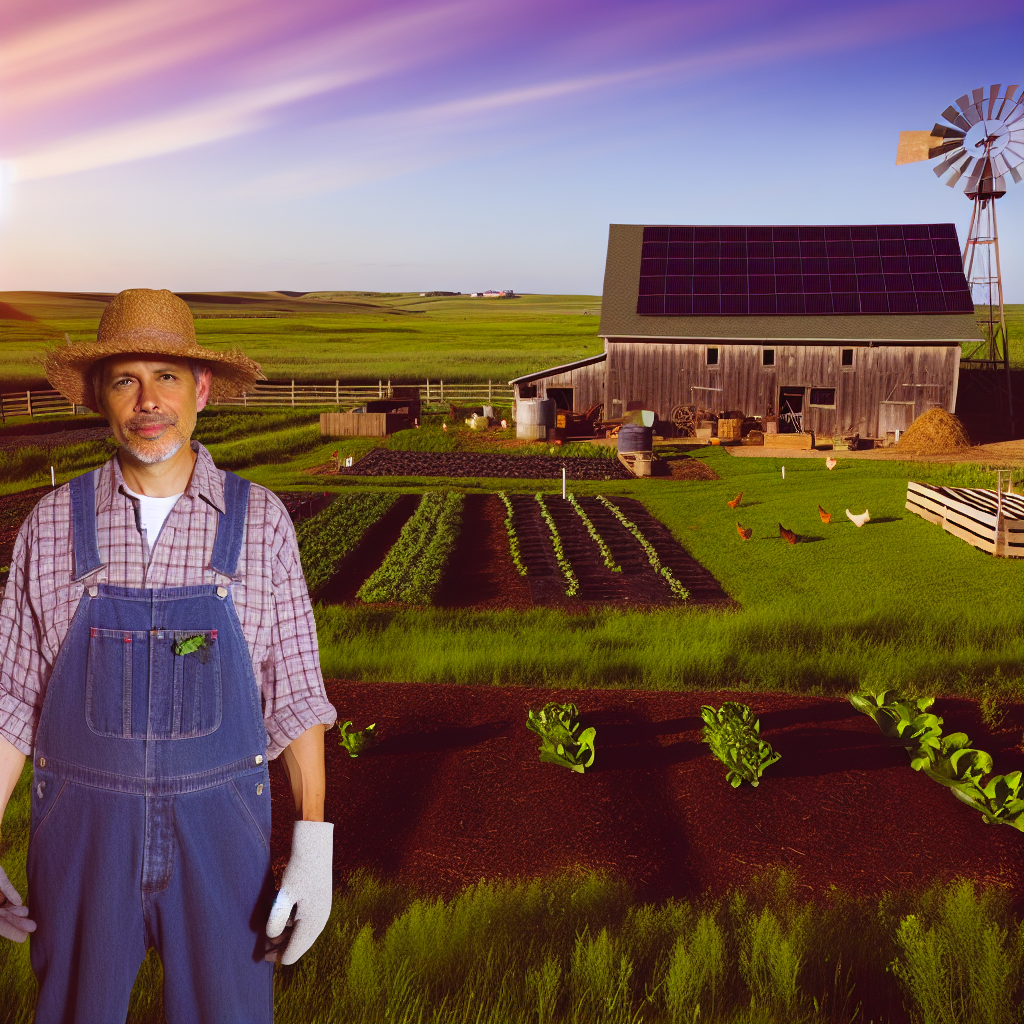Introduction to Organic Farming
Principles of Organic Farming
Organic farming emphasizes the use of natural processes and materials.
This approach fosters biodiversity and enhances soil health.
It avoids synthetic chemicals and genetically modified organisms.
Additionally, organic farming promotes ecological balance.
Practices in Organic Farming
Crop rotation enhances soil fertility and prevents disease.
This technique involves alternating crops in a specific sequence.
Cover cropping protects the soil from erosion during off-seasons.
Natural fertilizers, such as compost and manure, enrich the soil.
Pest management employs biological control and reduced pesticide use.
Benefits of Organic Farming
Organic farming provides healthier food choices for consumers.
It reduces environmental pollution and improves air quality.
Moreover, it supports sustainable agriculture and rural economies.
Farmers benefit from premium prices for organic products.
Challenges in Organic Farming
Transitioning to organic methods can be a lengthy process.
Farmers may face initial lower yields during the transition phase.
Transform Your Agribusiness
Unlock your farm's potential with expert advice tailored to your needs. Get actionable steps that drive real results.
Get StartedAdditionally, pest control can become a significant challenge.
Access to organic seeds and materials can also be limited.
Benefits of Organic Farming for Environmental Sustainability
Improved Soil Health
Organic farming enhances soil health significantly.
It promotes the growth of beneficial microorganisms.
Healthier soil results in better water retention.
Furthermore, organic matter practices enrich the soil.
This leads to increased nutrient availability for crops.
Reduction of Chemical Usage
Organic farming minimizes the use of synthetic chemicals.
As a result, it reduces the risk of soil and water pollution.
This approach utilizes natural pest control methods.
Consequently, it helps protect the ecosystem.
Biodiversity Promotion
Organic farms create habitats for diverse wildlife.
This encourages a variety of species to thrive.
Healthy ecosystems improve pest control naturally.
Additionally, it supports pollinators essential for crop production.
Climate Change Mitigation
Organic farming practices mitigate climate change effects.
These methods sequester carbon dioxide in the soil.
Moreover, they lower greenhouse gas emissions overall.
By enhancing soil structure, organic farms become more resilient.
Water Conservation
Organic farming uses water resources efficiently.
Healthy soils retain more moisture.
This consequently reduces irrigation needs.
Additionally, organic practices prevent soil erosion.
As a result, water quality improves in surrounding areas.
Showcase Your Farming Business
Publish your professional farming services profile on our blog for a one-time fee of $200 and reach a dedicated audience of farmers and agribusiness owners.
Publish Your ProfileSoil Health Management
Importance of Soil Health
Healthy soil forms the foundation of sustainable agriculture.
It enhances crop growth and productivity.
Additionally, healthy soil supports vital ecosystems.
Techniques for Enriching Soil Fertility
Cover Cropping
Cover crops are plants grown to protect and enrich the soil.
They prevent erosion and suppress weeds.
Moreover, cover crops enhance nutrient cycling.
- Legumes fix nitrogen in the soil.
- Grasses improve soil structure.
Crop Rotation
Crop rotation involves changing the type of crops grown in a field.
This technique prevents nutrient depletion.
It also disrupts pest and disease cycles.
- Rotate between deep-rooted and shallow-rooted plants.
- Vary the families of crops to improve soil diversity.
Composting
Composting recycles organic waste into nutrient-rich soil amendments.
It enhances soil structure and fertility.
Compost also aids in retaining soil moisture.
Furthermore, it boosts biological activity in the soil.
Organic Mulching
Organic mulches suppress weeds and retain soil moisture.
They also enhance soil temperature and structure.
Common materials for mulching include straw and wood chips.
- Apply a layer of mulch around plants.
- Maintain mulch depth for maximum effectiveness.
Monitoring Soil Health
Regular soil testing identifies nutrient needs and pH levels.
This information guides amendments for optimal fertility.
Furthermore, monitoring improves long-term soil management strategies.
Collect samples from various locations in the field.
Discover More: Seasonal Planning Tips for Community Supported Agriculture
Crop Rotation and Diversity: Enhancing Biodiversity in Agriculture
Importance of Crop Rotation
Crop rotation significantly improves soil health.
This practice prevents nutrient depletion in the soil.
Rotating crops disrupts pest and disease cycles.
Moreover, it encourages a diverse ecosystem.
Methods of Implementing Crop Rotation
Farmers can implement several techniques for effective crop rotation.
One method includes alternating deep-rooted and shallow-rooted plants.
Another approach is to rotate legumes with cereal crops.
This practice enhances nitrogen levels in the soil.
Furthermore, incorporating cover crops can protect the soil during off-seasons.
Benefits of Diverse Crop Systems
Diverse crop systems enhance agricultural resilience.
This variety helps mitigate risks associated with climate change.
It also supports a wider range of beneficial insects and pollinators.
Overall, diversity in cropping systems leads to healthier ecosystems.
Building a Biodiverse Farm
Creating a biodiverse farm involves strategic planning.
Farmers should consider integrating different plant species.
Additionally, incorporating native plants can attract beneficial wildlife.
This approach not only improves yields but also supports local ecosystems.
Ultimately, a diverse farm leads to sustainable agricultural practices.
Learn More: Planning Successful Agri-Tourism Events on Your Farm
Showcase Your Farming Business
Publish your professional farming services profile on our blog for a one-time fee of $200 and reach a dedicated audience of farmers and agribusiness owners.
Publish Your ProfileNatural Pest Management: Strategies for Reducing Chemical Use
Introduction to Natural Pest Management
Natural pest management focuses on eco-friendly methods to manage pests.
This approach reduces reliance on chemical pesticides.
Farmers can promote a healthier environment through sustainable practices.
Beneficial Insects
Beneficial insects play a vital role in controlling pest populations.
Ladybugs are known for consuming aphids.
Planting flowers attracts these natural predators to farms.
Additionally, lacewings feed on various pest larvae.
Cultural Practices
Cultural practices aid in pest management and enhance soil health.
Crop rotation helps disrupt pest life cycles.
Intercropping introduces diversity, which can confuse pests.
Implementing proper sanitation reduces potential pest habitats.
Natural Repellents
Natural repellents can deter pests without chemicals.
Essential oils, like neem and peppermint, show effective results.
Garlic sprays are also popular among organic farmers.
These solutions are easy to make and apply.
Monitoring and Observation
Regular monitoring ensures early detection of pest issues.
Farmers should observe crop health and pest presence closely.
This proactive approach allows for timely interventions.
Additionally, documenting findings helps refine management strategies.
Companion Planting
Companion planting involves pairing plants that benefit each other.
For example, marigolds repel nematodes and other pests.
Growing basil near tomatoes enhances their growth while deterring flies.
This method fosters a more resilient ecosystem.
Community Collaboration
Farmers can collaborate to control pest populations sustainably.
Sharing knowledge within the community enhances pest management efforts.
Collective action can significantly reduce pest outbreaks.
Local workshops provide valuable insights into effective strategies.
Uncover the Details: Sustainable Harvesting Methods For Farmers

Water Conservation Techniques in Organic Farming Systems
Importance of Water Conservation
Water conservation is vital in organic farming systems.
Sustainable practices help preserve water resources.
Additionally, efficient water use promotes crop health.
Rainwater Harvesting
Rainwater harvesting captures and stores rainwater effectively.
Farmers can install rain barrels to collect runoff.
This method reduces the reliance on municipal water systems.
Utilizing rainwater decreases the overall cost of irrigation.
Drip Irrigation Systems
Drip irrigation offers precise watering for crops.
This system minimizes evaporation and runoff significantly.
Efficient water delivery encourages deep root growth.
Farmers can customize drip lines to fit crop needs.
Soil Moisture Management
Maintaining soil moisture is key to successful organic farming.
Showcase Your Farming Business
Publish your professional farming services profile on our blog for a one-time fee of $200 and reach a dedicated audience of farmers and agribusiness owners.
Publish Your ProfileMulching helps retain soil moisture by preventing evaporation.
Cover crops can enhance moisture retention naturally.
Regular soil testing ensures optimal moisture levels.
Water-efficient Crop Selection
Selecting drought-resistant crops can save substantial water.
Farmers should consider native plants suited for local climates.
These crops often require less frequent watering.
Furthermore, they adapt better to changing weather conditions.
Creating Contours and Swales
Contouring and swaling are effective landscape techniques.
These methods slow down waterflow and enhance infiltration.
Consequently, they reduce soil erosion significantly.
Properly shaped landscapes promote natural water retention.
Monitoring and Maintenance
Consistently monitoring water usage is essential for efficiency.
Farmers should conduct regular inspections of irrigation systems.
Identifying leaks or inefficient practices can save water.
Proper maintenance ensures optimal performance throughout the season.
Uncover the Details: Agri-Tourism and Direct Sales: A Winning Combo
Utilizing Cover Crops
Introduction to Cover Crops
Cover crops play a vital role in sustainable farming practices.
They are grown primarily to enhance soil health.
These crops help prevent soil erosion and retain moisture.
Moreover, cover crops improve nutrient cycling in the soil.
Benefits of Using Cover Crops
Cover crops offer numerous benefits to farmers and the environment.
First, they help to prevent soil erosion.
This occurs by holding soil in place with their roots.
Second, they enhance soil fertility by fixing nitrogen.
Leguminous cover crops, such as clover, enrich the soil with nitrogen.
Furthermore, cover crops increase organic matter content.
Increased organic matter enhances soil structure and water retention.
Types of Cover Crops
Several types of cover crops are suitable for various farming systems.
Legumes include varieties like vetch and peas.
They are excellent for nitrogen fixation.
Grasses such as rye and oats are also effective cover crops.
These grasses improve soil structure and prevent compaction.
Incorporating Cover Crops into Farming
Integrating cover crops into a crop rotation plan is essential.
Select appropriate cover crops based on local climate conditions.
Additionally, consider the main crops grown on the farm.
Plant cover crops in fall or after main crop harvest.
Moreover, ensure timely termination of cover crops before planting.
Challenges in Cover Crop Adoption
Despite their benefits, some challenges exist with cover crop adoption.
Farmers may face financial constraints in initial investments.
Additionally, managing cover crops requires extra effort and planning.
Showcase Your Farming Business
Publish your professional farming services profile on our blog for a one-time fee of $200 and reach a dedicated audience of farmers and agribusiness owners.
Publish Your ProfileSome farmers worry about competition for nutrients with main crops.
Education and support programs can help address these concerns.
Successful Case Studies
Many farmers have successfully implemented cover crops.
For instance, Emily Victor, a farmer in Nebraska, uses cover crops.
She reports improved soil health and higher yields.
Similarly, the Williamson Farm in California benefits from cover cropping.
They have enhanced their soil quality and reduced erosion rates.
Composting and Organic Matter Management
Importance of Composting
Composting enriches the soil with essential nutrients.
It also helps retain soil moisture.
This process encourages beneficial microbial activity.
Moreover, composting reduces landfill waste.
As a result, it minimizes greenhouse gas emissions.
Types of Composting Techniques
Several composting methods exist for organic matter management.
Each method has unique benefits and applications.
- Traditional Composting involves layering green and brown materials.
- Vermicomposting utilizes worms to break down organic matter.
- Bokashi composting uses fermentation to process food waste.
Creating Your Compost
Follow these steps to create your compost effectively.
- Choose a suitable location that provides good drainage.
- Gather organic materials like kitchen scraps and yard waste.
- Layer green and brown materials to balance nitrogen and carbon.
- Keep the compost moist but not soggy.
- Turn the compost regularly to aerate and accelerate decomposition.
Benefits of Organic Matter Management
Effective organic matter management leads to healthy soils.
It enhances soil structure and fertility.
Furthermore, it supports plant growth and productivity.
Healthy soil also helps prevent erosion.
Ultimately, this approach fosters sustainable farming practices.
Challenges in Composting
Despite its benefits, composting may present challenges.
Unpleasant odors can arise if organic materials do not break down properly.
Additionally, pests might be attracted to poorly managed compost bins.
To counteract these issues, regular monitoring is essential.
Embracing Composting for a Sustainable Future
Embracing composting enriches the environment and promotes sustainability.
Individuals and communities can significantly impact agricultural practices.
By adopting effective composting techniques, we can build a resilient future.




